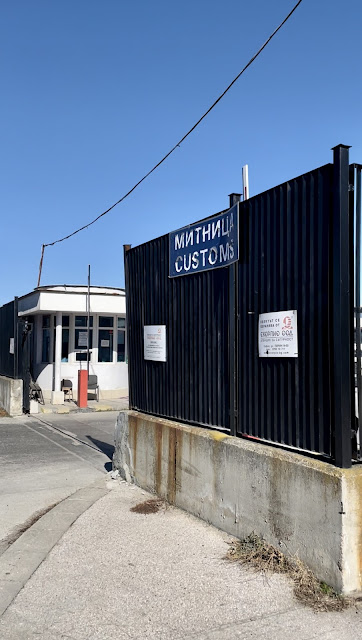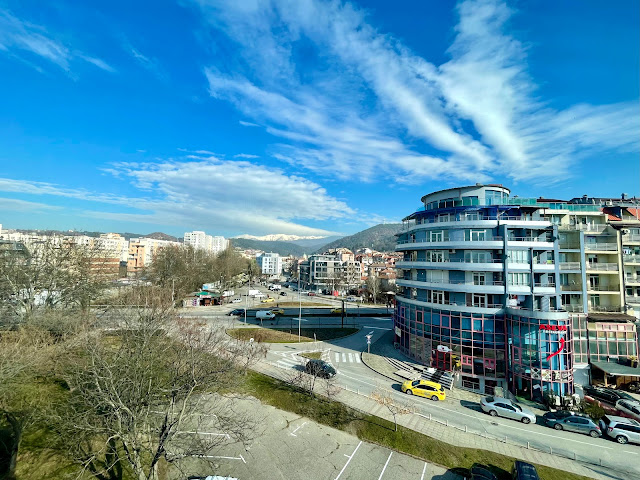The past two weeks...
As my second month in Bulgaria concludes, I have run into some of the more logistical tasks of being abroad. From processing an American package through Bulgarian customs to navigating travel during a global pandemic, there are many factors to consider while abroad. Besides these tasks, I've learned about a defining Bulgarian holiday, and, as always, I've eaten some delectable meals.
I Learned...
"Baba Marta" Holiday
Today marks the first of March. Честита Баба Марта! This translates to "Happy Baba Marta!" Every year on March 1st, Bulgarians celebrate the day of Baba (Grandmother) Marta (March). This day signifies the welcoming of the anticipated spring.
For the past several days, my walk to class through the city has been decorated with street stands of locals selling martenitsi, handmade decorations of red and white thread. These decorations come in the form of bracelets, necklaces, tassels, and more, but the traditional form depicts two small dolls: a male made of white thread, and a female made of red thread.
Martenitsa
No matter the form, the white of martenitsa is a symbol of purity and joy, and the red represents health and passion. On March 1st, Bulgarians gift martenitsi to one another as a wish for health and happiness throughout the year. Martenitsi are to be worn around the wrist, pinned to clothes, or hung in the home. In the coming weeks, at the first sight of a stork of a blossoming fruit tree, the martenitsa is removed and tied to the blossoming tree as the giver makes a wish which is to come true during the year.
The legend behind this tradition is built around the mythical figure Baba Marta, an elderly woman whose mood swings brought changes to the weather. Bulgarians would wear red and white to ask Baba Marta for mercy and for the winter to end.
I Ate...
Roots Pizzeria
One of my favorite restaurants in Blagoevgrad is a pizzeria called Roots. It's a small establishment with good music, friendly staff, great food, and a cute kitten named Lemon. It's my goal to try every pizza on the menu; I am almost there. Pictured below is one topped with prosciutto, cherry tomatoes, arugula, and parmesan. They even top some of their pizzas with local honey.
Friends' Picnic
Two weeks ago, the temperature got up to around 60°F, so a group of exchange students and I decided to have a large picnic. Sitting out on a green grass lawn at AUBG and enjoying each others' company for a couple hours, we played Spikeball while chowing down on some local cheeses, rose petal jam, figs and strawberries, and croissants.
Photo provided by: Nikki
I Experienced...
Customs
My father has so graciously shipped me a mattress cooler - refer to my Week 3 post to read about my saga with the indoor heat in Bulgaria - and believe me when I tell you it's been a struggle to receive this package. Shipping from the U.S., the cooler has been stuck in Bulgarian Customs going on 12 days now. To forward a package from the U.S. through Customs, you have to provide DHL with an EORI number. Guess how you're able to obtain an EORI number? By providing proof of Bulgarian residency. And guess what's not an accepted form of Bulgarian residency? A Bulgarian type D long-stay visa. I'm going to assume you can infer the answer to the question of what form of Bulgarian ID I have.
After going back and forth with DHL for several days, I ended up taking a taxi to the Blagoevgrad Customs office. This was my first time taking a taxi alone. It is known that the majority of the taxi drivers speak little, or most likely zero, english. After five minutes of attempting to convince a driver to take me to a Customs office for which DHL had to send me a coordinate pin and making a mutual agreement with him to follow my map, he finally confirmed, "Da." I got in the taxi. Through Google Translate and my broken Bulgarian, I somehow made it the office. He let me out on a completely vacant road, and I immediately knew I would struggle to get a taxi back. I turned and followed a truck in through the delivery entrance shown below.
Blagoevgrad Customs entryI came prepared with all the forms I was told to bring, and after the Customs officer glanced at my visa, he gave me a singular piece of paper written entirely in Bulgarian, and told me to leave. That was it. I wasn't allowed to fill out the form in the office and return it there. I had to leave and "have a Bulgarian friend help translate" the form for me and return it by email. What an odd system. After begging the other officer to assist me in calling a taxi, I returned to campus. And with the help of my ever-so-kind Bulgarian friend, my package should be on its way.
COVID-19 Testing
Traveling during a global pandemic is a bit tricky, but being vaccinated makes it feasible. For example, there are many establishments in which you must show your COVID-19 Vaccination Record (or EU Digital COVID Certificate) to enter. While some countries require just a vaccination record or negative viral test result to enter, some countries require the negative test result. With restrictions around the world changing daily, it's tasking to keep up on the stipulations. Nevertheless, I am thankful for the opportunity to be abroad this semester, which was granted to me because of my vaccination status.
For a weekend trip we are taking in the coming days, we had to get PCR tests. This was a culture shock. We walked to the hospital and entered through the front pillars, which doubled as the ambulance driveway, and tripled as a taxi drop off.
 Pulse Hospital entrance: An area for ambulances, cars, and foot traffic
Pulse Hospital entrance: An area for ambulances, cars, and foot traffic
On the left of the open-air hospital center was the COVID testing site. One at a time, we entered this makeshift testing site and collected our results six hours later. Spoiler alert - we were all negative.
 COVID testing site. To the left is the ambulance driveway to the emergency department.
COVID testing site. To the left is the ambulance driveway to the emergency department.
Final Thoughts...
Last Thursday, the 24th of February, I woke to reports of explosions in Ukraine by Russian airstrikes. This Russian invasion of Ukraine has sparked global attention around one of the tensest international situations since World War II.
AUBG has been eerie since that morning. While I can never truly understand the experiences and feelings of my Ukrainian and other international peers whose home countries are affected by this crisis, it is completely surreal to be studying in an eastern European country that shares the Black Sea coast with Ukraine and Russia. The following day's classes were canceled to give the students a chance to decompress, and there will be a peaceful demonstration held this week to support our Ukrainian friends.
While we are all in this state of reflection, remember to stay informed using reliable sources. Take a moment to read my dear friend and political science major Claire Shaw's article titled "What's Happening in Ukraine and What You Can Do" to gain an understanding of the history of this conflict.
Listed below are sources through which you can donate to Ukraine's citizens to support them with basic necessities and access to medical and psychological services. These sources were verified and provided to me by AUBG.
UNICEF
Project Hope
Global Giving
International Medical Corps
Julia Dick
References
“The Bulgarian Tradition of Baba Marta and Martenitsa.” Bnt.bg, BNT, https://bnt.bg/news/the-bulgarian-tradition-of-baba-marta-and-martenitsa-134433news.html.










Interesting adventures! Love reading your updates. Thank you for the links for donation sites. Just completed one. Praying for all those impacted. Love you!
ReplyDeleteThank you, Nel. Can't wait to see you soon!
Delete